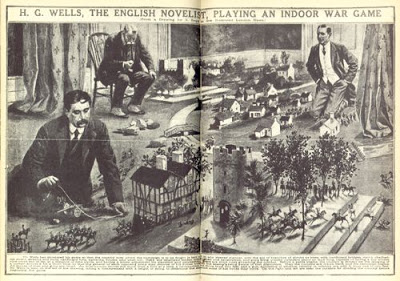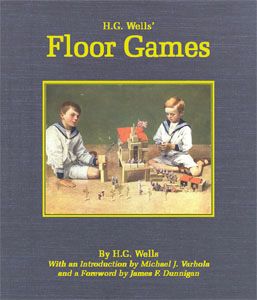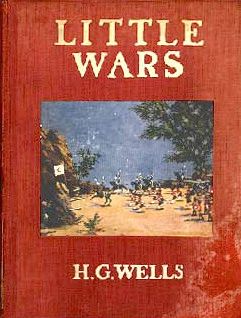Philosophy

Floor Games
Little Wars
- What's The Difference?: Athletics, Sports, And Games
What is the difference between games, sports, and athletics? While surely not all games are sports, can we say that all sports are games? Not all athletic activities sports, but are all sports athletic activities? What about competitive ballroom dancing?...
- The Value Of A Ball
The Old Man took me and LilBro to ball games as kids and now I take my short people, but as many games as I've gone to, one thing I've never done is come away with a ball. There are four ways a fan gets a game ball -- catch a foul ball or home...
- Drinking Games
I had lunch yesterday with a Playground regular and had an interesting discussion about an element of college policy. Underage students are not allowed to possess alcohol, those of age are, but even those who may legally purchase and imbibe are not allowed...
- What Is Style?
We picked up a great game, bananagrams. Don't let the cutesy name fool you, it's a good one. It's really just two sets of scrabble tiles with no point values. Each player gets 21 random tiles and it is a race to make a complete board out of...
- Chemistry Sets...back?
Dangerous Book for Boys A new British book and related science kits are on the market and proving to be very popular. Will it work? Well, it can't mirror the old chemistry sets of A. C. Gilbert or Porter. Furthermore, one wonders if this isn't...
Philosophy
H. G. Wells...a gamer too

Copy reads...
Mr. Wells has developed his game so that the country over which the campaign is to be fought is laid out in any desired manner, with the aid of branches of shrubs as trees, with cardboard bridges, rocks, chalked-out rivers, streams and fords, cardboard forts, barracks, houses, and what not; there are employed leaden infantrymen and cavalrymen, and guns firing wooden cylinders about an inch long, capable of hitting a toy soldiers nine times out of ten at a distance of nine yards, and having a screw adjustment for elevation and depression. There are strict rules governing the combat. Before the battle begins, the country is divided by the drawing of a curtain across it for a short time, so that the general of each opposing army may dispose of his forces without the enemy's being aware of that disposition. Then the curtains are drawn back and the campaign begins. All moves of men and guns are timed. An infantryman moves not more than a foot at a time, a cavalryman not more than two feet, and a gun, according to whether cavalry or infantry are with it, from one to two feet. Mr. Wells is seen on the left of the drawing, taking a measurement with a length of string, to determine the distance some of his forces may move. On the right and left are seen the curtains for dividing the country before beginning the game.
He wrote two books, "Floor Games" and "Little Wars" , of rules and theory for playing games with children’s toys and toy soldiers.


Little Wars (A Game for Boys from twelve years of age to one hundred and fifty and for that more intelligent sort of girl who likes boys' games and books) With an Appendix on Kriegspiel By H. G. Wells - Little Wars was written by the famous author H. G. Wells in 1913 and is a set of rules for playing with toy soldiers. Its full title is Little Wars: a game for boys from twelve years of age to one hundred and fifty and for that more intelligent sort of girl who likes boys' games and books. FLOOR GAMES A Father's Account of Play and Its Legacy of Healing by Herbert George Wells. Floor Games was written by science fiction author H. G. Wells in 1911 and is a lighthearted, sometimes humorous discussion about the theory, purpose, and methodology of playing a variety of children's games with models, miniatures, and other props. Floor Games is often somewhat misleadingly characterized as a "companion book" to Well's Little Wars, even though that book was not actually published until 1913, two years after the release of Floor Games. As the text of the earlier book makes clear, however, it was conceived of as a self-standing volume that the author might eventually decide to follow with a text devoted purely to war games.
Project Gutenberg offers both books for free...
Mr. Wells has developed his game so that the country over which the campaign is to be fought is laid out in any desired manner, with the aid of branches of shrubs as trees, with cardboard bridges, rocks, chalked-out rivers, streams and fords, cardboard forts, barracks, houses, and what not; there are employed leaden infantrymen and cavalrymen, and guns firing wooden cylinders about an inch long, capable of hitting a toy soldiers nine times out of ten at a distance of nine yards, and having a screw adjustment for elevation and depression. There are strict rules governing the combat. Before the battle begins, the country is divided by the drawing of a curtain across it for a short time, so that the general of each opposing army may dispose of his forces without the enemy's being aware of that disposition. Then the curtains are drawn back and the campaign begins. All moves of men and guns are timed. An infantryman moves not more than a foot at a time, a cavalryman not more than two feet, and a gun, according to whether cavalry or infantry are with it, from one to two feet. Mr. Wells is seen on the left of the drawing, taking a measurement with a length of string, to determine the distance some of his forces may move. On the right and left are seen the curtains for dividing the country before beginning the game.
He wrote two books, "Floor Games" and "Little Wars" , of rules and theory for playing games with children’s toys and toy soldiers.


Project Gutenberg offers both books for free...
Floor Games
Little Wars
- What's The Difference?: Athletics, Sports, And Games
What is the difference between games, sports, and athletics? While surely not all games are sports, can we say that all sports are games? Not all athletic activities sports, but are all sports athletic activities? What about competitive ballroom dancing?...
- The Value Of A Ball
The Old Man took me and LilBro to ball games as kids and now I take my short people, but as many games as I've gone to, one thing I've never done is come away with a ball. There are four ways a fan gets a game ball -- catch a foul ball or home...
- Drinking Games
I had lunch yesterday with a Playground regular and had an interesting discussion about an element of college policy. Underage students are not allowed to possess alcohol, those of age are, but even those who may legally purchase and imbibe are not allowed...
- What Is Style?
We picked up a great game, bananagrams. Don't let the cutesy name fool you, it's a good one. It's really just two sets of scrabble tiles with no point values. Each player gets 21 random tiles and it is a race to make a complete board out of...
- Chemistry Sets...back?
Dangerous Book for Boys A new British book and related science kits are on the market and proving to be very popular. Will it work? Well, it can't mirror the old chemistry sets of A. C. Gilbert or Porter. Furthermore, one wonders if this isn't...
